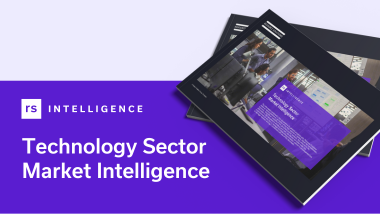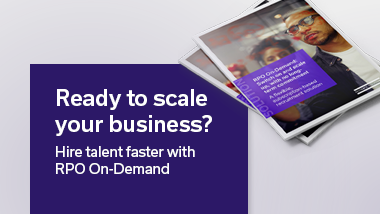Three ways leaders can support Talent Acquisition teams during periods of overwhelm
Overworked. Overwhelmed. Overstretched. On the brink of burnout?
The current predicament for many talent acquisition (TA) professionals doesn’t make for happy reading. According to Tribepad’s 2022 "State of the Recruitment Sector" report, 1 in 4 recruiters are struggling to cope with workload. Under-resourced teams, lack of talent and pressure to recruit the right people were cited as the top three contributors to stress.
This isn’t surprising given the UK jobs vacancy boom. Quarterly Office for National Statistics (ONS) figures have shown that numbers have been at an all-time high, peaking at 1.3m in March-May 2022 and consistently above the 1.2 million mark for over a year. That’s almost half a million higher than in Q1 2020 before the true impact of the pandemic started to be felt.
Yet, despite the challenges and economic backdrop, CEOs remain confident about the resilience of their organisations: 8 in 10 expect their headcount to increase over the next three years, as the findings of KPMG’s "CEO 2022 Outlook" reveal.
There are three key areas leaders can look at now which will have a direct impact on the outcomes of their TA function. And while we appreciate that every organisation and industry faces very different realities, focusing on all three in tandem will take you to a far better place – regardless of the nuances of your business.
We examine each in turn:
1. Prioritise the welfare of your employees
As the pandemic and remote working taught us, leaders and managers need to have an even greater duty of care towards their employees. Regular weekly check-ins are an absolute must so they can understand why people are struggling and what can be done about it.
It might be a case of resetting priorities to see which areas individuals need to focus on and which ones can be put aside, at least temporarily. Communication is key not only between managers and their teams but also with senior leadership. And the message coming from the top must seek to eradicate what David Novak refers to as ‘recognition deficit’. Appreciation of people’s efforts in trying times is vital.
Professor Sir Cary Cooper MBE is one of the UK’s leading stress and wellbeing experts. He says that managers mustn’t avoid ‘people problems’ and they and employees must open up about any challenges e affecting their mental health. “Share your feelings with family and friends, your natural social support system in life – they need to know when you feel low or anxious,” he advises.
Flexible working, employee assistance programmes (EAPs) and company wellness programmes can all help improve the situation as will having a recognition culture and support from management. But the tone must be set at the top.
2. Process inspection: review your ‘as is’ set-up
First thing’s first – talk to your recruitment team. They’re the ones on the frontline, they’re the ones that know what’s working and what needs to be fixed. Once you’ve uncovered where the problems lie and which part of the recruitment process need to be looked at, you can then see what’s achievable given your current or "as is" status.
For example, if your sourcing strategy isn’t generating enough quality candidates – according to Gartner’s 2023 "HR Top Priorities Report", over a third (36%) felt that that was indeed the case – you have to ask yourself why. Is it because your TA teams aren’t using the right mix of sourcing channels and not tapping into diverse talent pools? Or maybe your EVP needs to be bolstered so that you can compete with your competitors. The same Gartner report found that half the organisations surveyed expect competition for talent to increase significantly during the next 6 months. You’ve been warned!
There are many aspects of the process to review, some more complex than others. From the initial job ad to the application process, interview scheduling and time to offer, there are different elements that can be fine-tuned to ensure a smoother and quicker process. Leaders could themselves be part of the blockage. Not delegating the right tasks, at the right time can cause inertia and contribute to inefficiencies in the process.
But it comes back to time poor and under-resourced teams. How can you bring the changes if you don’t have the headcount or the skills to make it happen?
3. Flexible and agile recruitment outsourcing from Resource Solutions
You might want to consider partnering with an external provider to help with parts of your permanent recruitment. Here we’re entering in the realm of Recruitment Process Outsourcing (RPO) but a different version to the one you may know and be accustomed to.
To meet fluctuating demands and burgeoning workloads, Project RPO can be deployed quickly to assist you with your short-term requirements. Lasting anything from six months to a year, it can help you with a specific business objective, for example a relocation or opening up an office in a new country as you seek to expand your global footprint.
The benefits of such an arrangement are many. Not only will you be getting the deep domain expertise of your RPO partner but also their in-depth knowledge of local regulations and compliance. You’ll benefit from the latest tech tools to boost talent attraction as well as the priceless data and insights that can inform your business decisions.
You might instead need support with one or more component of the recruitment process, such as candidate screening and compliance, sourcing and shortlisting or employer branding and onboarding. Welcome to Modular RPO, which gives you the total flexibility to pick and choose the bits you want to outsource. To add another layer of agility, our redefined Modular RPO solution is also available on a short-term contract.
In summary:
Put your people first
Don’t ignore the mental health of your employees. Tackle any causes of stress head on. Leaders must promote a culture of recognition, feedback and open communication.
Examine processes
Talk to your teams and find out which are the critical areas that need to be addressed. See where you can create efficiencies and introduce leaner ways of working.
Consider flexible options
Could a project or modular RPO be just the ticket? Remember, these are short-term, quickly deployable, customised solutions to help you with specific business objectives.
These three factors combined can make a significant difference to your results and bottom line. Helping you move from a state of overwhelm to optimum performance.
If you’d like to discuss your permanent hiring requirements further and learn more about our project, modular and ‘on demand’ RPO solutions, get in touch now!













